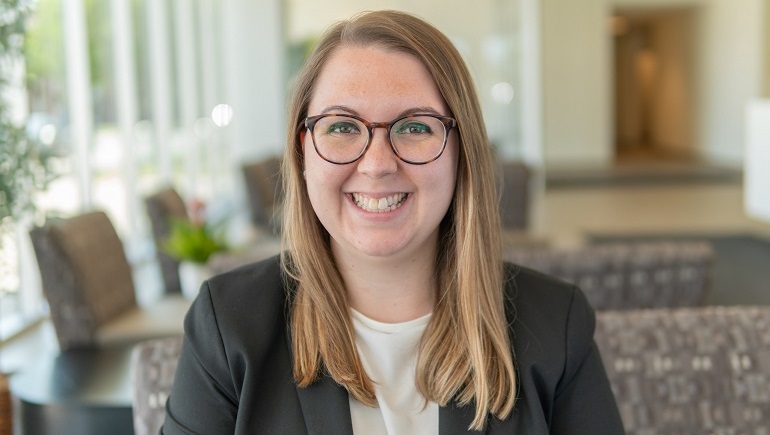
Clara Zundel, Ph.D., has met a major steppingstone in the journey to becoming an independent investigator.
Dr. Zundel, a postdoctoral fellow working in the lab of Wayne State University School of Medicine Assistant Professor of Psychiatry and Behavioral Neurosciences Hilary Marusak, Ph.D., has obtained her first grant from the National Institutes of Health.
She will use the grant from the National Institute of Mental Health to help determine if air pollution exposure in youth may impact brain development and brain functioning, increasing the risk for anxiety.
The Ruth L. Kirschstein Postdoctoral Individual National Research Service Award, or F32, was granted for “Impact of ambient PM2.5 concentrations on fear extinction recall, frontolimbic circuitry, and anxiety in adolescents.”
“This is a prestigious national award that recognizes the best and the brightest, and the most promising early career mental health researchers. Clara exactly embodies this,” Dr. Marusak said. “I feel fortunate to have had the pleasure to work alongside her and learn from her and with her throughout this process. I know how hard she has worked for this award and to achieve her goals, and I am so proud.”
Dr. Zundel’s research topic is both important and timely.
“We all experienced the impacts that air pollution can have this summer with the Canada wildfire smoke. Increasingly, Clara’s research and others shows that air pollution not only affects the lungs but also the brain. With climate change, these effects will be even more salient and devastating,” Dr. Marusak added.
Dr. Zundel received her doctorate from Boston University School of Medicine in September 2021, and joined Dr. Marusak’s lab that month. She is a Detroit native who received her bachelor’s degree in psychology from WSU.
Question: How do you feel to be receiving your first NIH grant?
Answer: I feel very excited to finally be receiving this F32! Dr. Marusak and I started conceiving this project back in early 2020. I always like to shine a light on the persistence that is needed in research and in grant writing in general. Dr. Marusak and I submitted this grant four times, switching NIH institutes halfway through. We went from having our grant ‘not discussed’ to finally receiving a top and fundable score. Persistence pays!
Q: How would you describe your project in lay terms?
A: Recent research has shown a link between air pollution exposure, and specifically particulate matter, and heightened risk of anxiety in adolescents. However, the underlying neurobehavioral mechanisms behind this association, or what is going on in the brain to lead to this increased risk of anxiety, is currently still unknown. Adolescence is characterized as a period of massive neurodevelopment, specifically frontolimbic development, as well as psychiatric vulnerability. Therefore, we believe that air pollution exposure during this critical period may impact brain development and brain functioning in a way that may increase risk for anxiety. We will assess this by having metropolitan Detroit adolescents, ages 10 to 17, complete a two-day experiment that involves functional MRI imaging while they complete a fear regulation task. This project will be an important first step toward identifying mechanisms underlying environmental risk of psychopathology and will lay a critical foundation for early interventions to stem the etiology of anxiety in at-risk pollution-exposed youth.
Q: Why did you want to join the Marusak lab?
A: One of the main reasons I wanted to join the Marusak lab was to get key training in functional neuroimaging, or fMRI. My graduate research and training focused primarily on neuropsychological assessment and some structural imaging, and I really wanted to get advanced training in fMRI to use as a technique in my future career. Further, Dr. Marusak has developed a very novel neurobehavioral task that assesses brain and behavioral markers of anxiety risk. This task incorporates virtual reality equipment. I wanted to learn more about this novel task and incorporate it into my own research examining environmental risk of psychopathology.